A richly historical land with some of the best cuisine you will ever taste, the scenery from beaches to mountains and the great city of İstanbul.

Epic History
From the ancient port city of Ephesus (Efes) to the soaring Byzantine dome of Aya Sofya, Turkey has more than its fair share of world-famous ruins and monuments. A succession of historical figures and empires – including the Romans, Byzantines and Ottomans – have all left their mark on this former stopover along the Silk Road. Experiencing their legacy takes you from the closeted quarters of the sultan and his harem in İstanbul’s sprawling Topkapı Palace to the romantic and mysterious Lycian ruins on Mediterranean beaches.
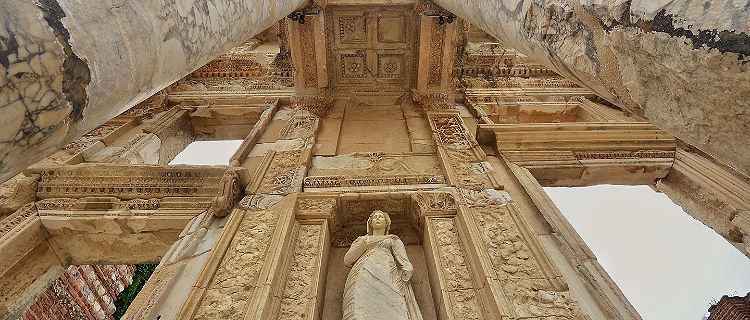
A bit of history about ANZAC Day
Anzac Day is a national day of remembrance in Australia and New Zealand that broadly commemorates all Australians and New Zealanders “who served and died in all wars, conflicts, and peacekeeping operations” and “the contribution and suffering of all those who have served”. Observed on 25 April each year, Anzac Day was originally devised to honour the members of the Australian and New Zealand Army Corps (ANZAC) who served in the Gallipoli Campaign, their first engagement in the First World War (1914–1918).
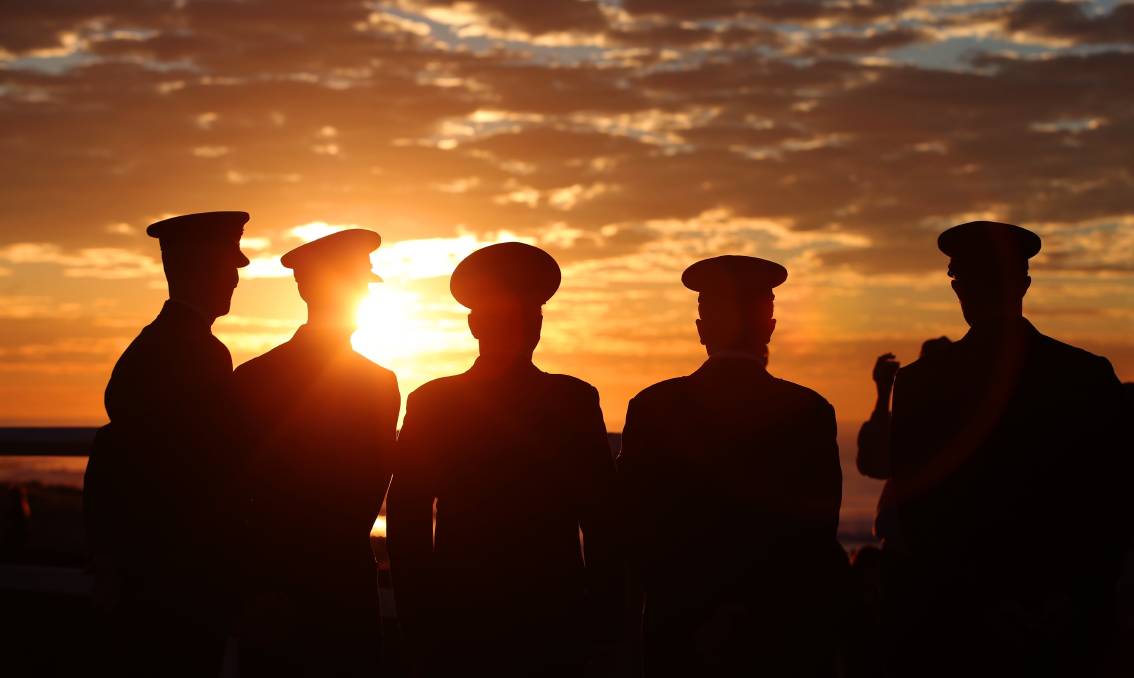
In Turkey, the name “ANZAC Cove” was officially recognised by the Turkish government on Anzac Day in 1985. In 1934, Kemal Atatürk delivered the following words to the first Australians, New Zealanders and British to visit the Gallipoli battlefields. This was later inscribed on a monolith at Ari Burnu Cemetery (ANZAC Beach) which was unveiled in 1985. The words also appear on the Kemal Atatürk Memorial, Canberra, and the Atatürk Memorial in Wellington
Those heroes that shed their blood
And lost their lives.
You are now lying in the soil of a friendly country.
Therefore rest in peace.
There is no difference between the Johnnies
And the Mehmets to us where they lie side by side
Here in this country of ours.
You, the mothers,
Who sent their sons from far away countries
Wipe away your tears,
Your sons are now lying in our bosom
And are in peace
After having lost their lives on this land they have
Become our sons as well.
In 1990, to mark the 75th anniversary of the Gallipoli landing, Government officials from Australia and New Zealand (including Australian Prime Minister Bob Hawke and New Zealand Governor-General Paul Reeves) as well as most of the last surviving Gallipoli veterans, and many Australian and New Zealand tourists travelled to Turkey for a special Dawn Service at Gallipoli.
Every year, you can join hundreds of fellow Australians and New Zealanders as they gather to remember and honour the fallen, attend the dawn service and pay their respects on the very same shores. The memorial sites and stunning atmosphere take you back in time and guide you through this unique experience.
Click on the image below and watch the video to discover more about the history about ANZAC day telling by fellow travellers:
Lyrical Landscapes
Turkey’s diverse landscapes, from Aegean olive groves to eastern steppe, provide a lyrical setting for its many great ruins. The country’s most magical scenery is to be found in Asian Anatolia, where beautiful vistas are provided by the vertiginous Mediterranean coastline, Cappadocia’s otherworldly ‘fairy chimney’ rock formations and wavy valleys, the alpine pastures of the Kaçkar Mountains, and golden beaches such as 18km-long Patara. Whether you settle down with a çay to enjoy the view across mountain-ringed Lake Eğirdir or explore the hilly hinterland on the southwest coast’s many peninsulas, Turkey’s landscape will leave a lasting impression.
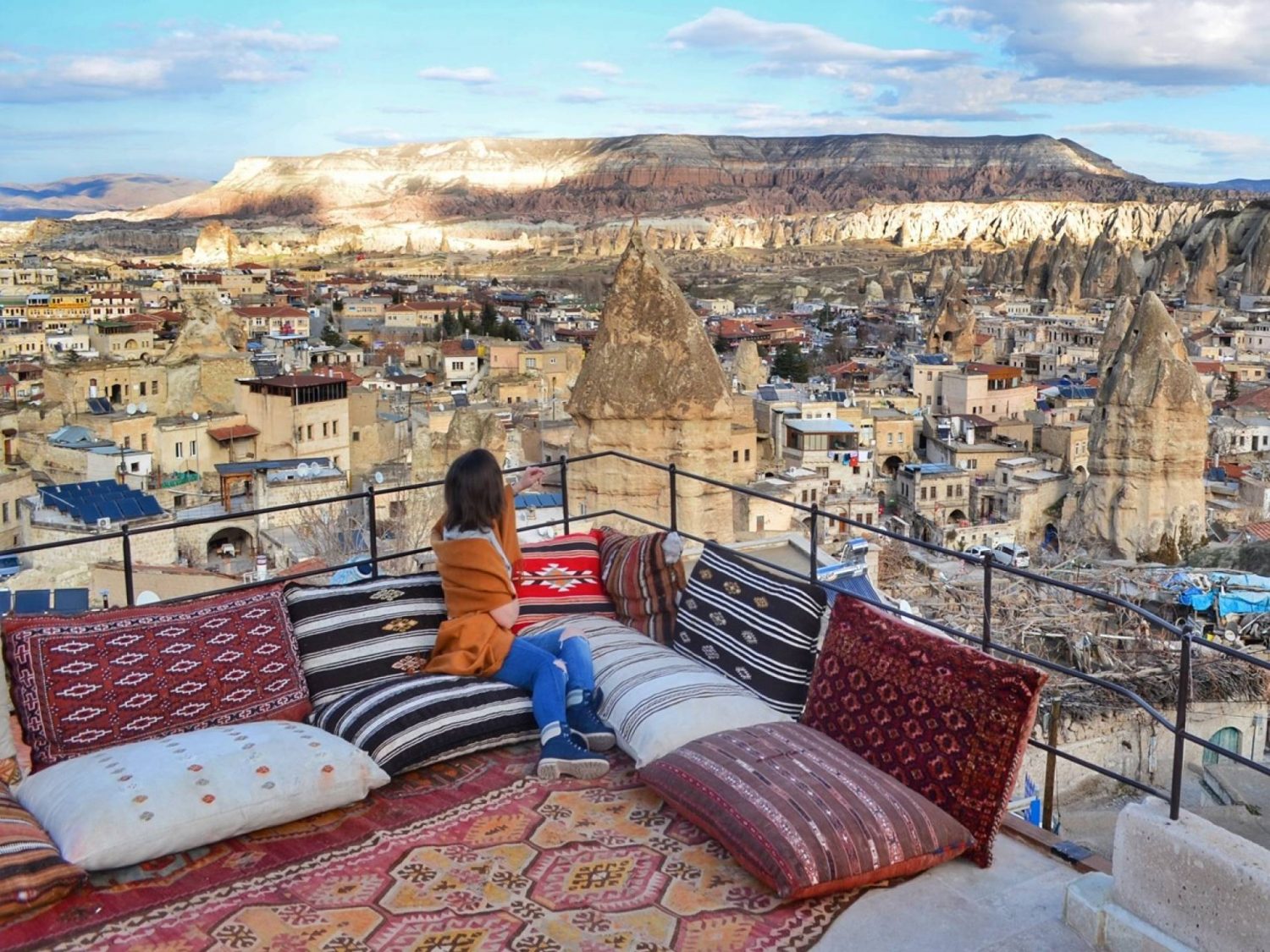
Activities Galore
Turkey offers activities to suit every temperament, from outdoors adventure to cultural enrichment. Watery fun includes diving, windsurfing, rafting and canyoning in mountain gorges, kayaking over Kekova’s sunken ruins and traditional gület cruises on the Mediterranean and Aegean. Or take to the air with Ölüdeniz’ thrilling paragliding flights or a hot-air balloon ride over Cappadocia. For a fresh angle on stunning Turkish scenery, trek to highland pastures or walk part of the Lycian Way trail. In town, take a culinary course, soak in the hamam or sign up for a culinary or cultural walking tour.
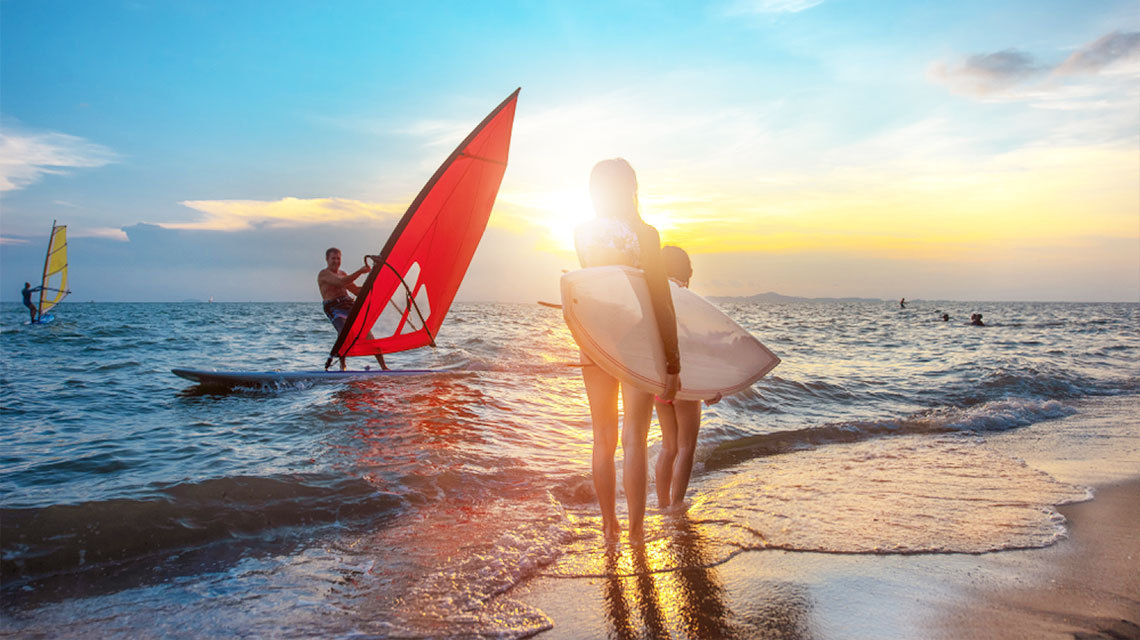
Eating and Drinking
The best thing about sampling Turkey’s delicious specialities – ranging from meze on a Mediterranean harbour to a pension breakfast featuring ingredients fresh from the kitchen garden – is that they take you to the heart of Turkish culture. For the sociable and family-orientated Turks, gathering together and eating well is a time-honoured ritual. So get stuck into olive oil–lathered Aegean vegetables, spicy Anatolian kebaps and dishes from Turkey’s many other corners – and as you drink a tulip-shaped glass of çay and contemplate some baklava for dessert, remember that eating is deepening your understanding of Turkey.
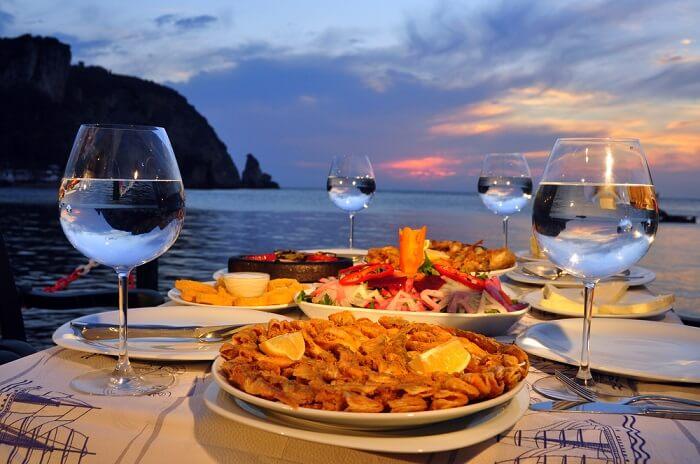
You can start your day with a delicious ‘Turkish breakfast’; Turkish bread, white cheese, tomatoes, olives, cucumbers, boiled egg, jam or honey and of course Turkish tea. Alternatively, try the Menemen, which is scrambled eggs with peppers, onion, tomato and if you’re lucky salami. At most of the hotels, you will be served a ‘buffet breakfast’ with a wide variety of foods.
There are two types of restaurants in Turkey; restaurants which have an a-la-carte menu with food on display that will be cooked for you and ‘ready meal’ restaurants which have a range of previously prepared dishes in warming trays for you to choose. The beauty of ‘ready meal’ restaurants is that you can try a wide range of small dishes for a relatively cheap price.
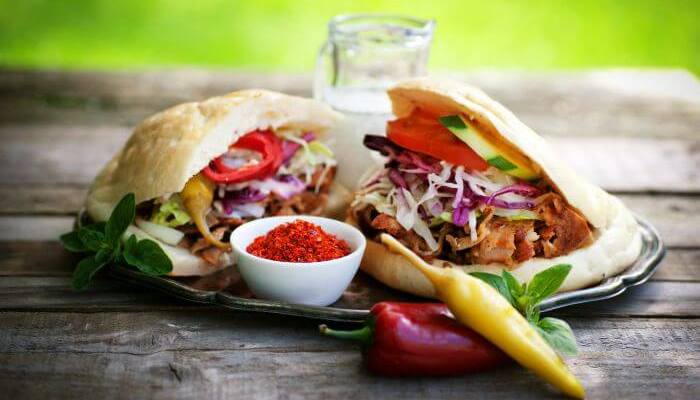
Travellers often find it surprising that tea (cay) rather than coffee is the national drink of Turkey. Grown along the Black Sea coast it has become an essential element of socialising. It is served in small fluted glasses with a very small spoon and saucer and cubes of sugar alongside. Coffee is also popular in Turkey and you can find numerous alternatives of Cappuccino, Nescafe, Espresso.
Carbonated soft drinks are available everywhere in Turkey – Cola or Pepsi, Fanta, Sprite, natural fruit and pulp drinks served in bottles include orange, lemon, apricot, peach and sour cherry.
You will find a wide variety of alcoholic drinks in Turkey, we suggest you don’t try them all in one night! Beer (bira) is ever popular. Efes, Pilsen and Tuborg are the leading brands, which are very refreshing in the summer.
Wine is grown in areas as diverse as Thrace and Cappadocia. The best domestic white wines are ‘Cankaya’, ‘Villa Doluca’, and ‘Kavaklidere’, made in Cappadocia, while ‘Yakut’ and ‘Kavalikdere’ produce the finest red. ‘Raki’, the national aperitif served with ice and water which turns the clear spirit cloudy, is a very warming drink although you may find it a bit rough at first – persevere.
Domestically produced gin, vodka and brandy are also available in most of the bars, pubs, and restaurants.
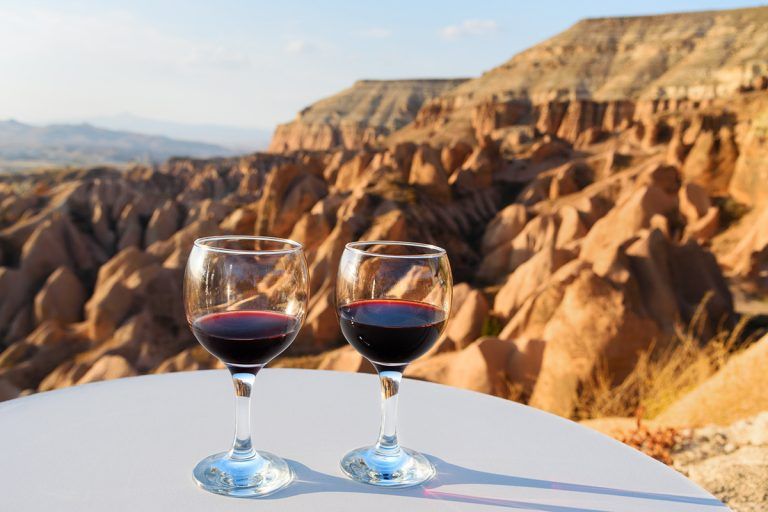
FQA
What is the currency used in Turkey and what is the exchange rate with the Australian dollar?
The currency in Turkey is the Turkish Lira (TRY).
TRY 1 = AUD 0.23
It’s usually best to obtain your Turkish liras in Turkey rather than before you leave home, as the exchange rates outside Turkey are usually not as good as those inside the country.
The easiest way to get cash liras is to stick your home bank card or credit card into a Turkish ATM (bancomat/cashpoint, cash machine).
Credit and debit cards are widely used in Turkey.
Although some large travel expenses such as hotel rooms and car rentals may be denominated in US dollars or euros, they may also be denominated and paid in Turkish liras. Some establishments offer discounts for payment in cash (because then they need not pay a percentage to the credit card company).
Should I tip in Turkey?
Tips are commonplace and customary in Turkey, for everything from table service in a restaurant to a massage in a Turkish bath. It is more often a reward for good service and for most local people, an essential means of supplementing their income, meagre by Western Standards. Often tourists to a country don’t know how much to tip or who to tip. The following amounts are a guideline:
Restaurants and taxis: Local markets and basic restaurants – leave the loose change. More up-market restaurants we suggest 5% to 10% of your bill.
Local guides: Throughout your trip, you may at times have a local guide in addition to your tour guide. We suggest TRY 5 per person per day for local guides.
Drivers: You may have a range of private drivers on your trip. Some may be with you for a short journey while others may be with you for several days. We would suggest a higher tip for those more involved with the group however TRY 5 per person per day is generally appropriate.
Gulet Boat Trips: If you are travelling through Southern Turkey on a Gulet Boat trip we suggest TRY 5 per person per day for the boat staff.
Do I need a Visa to travel to Turkey if I have an Australian passport?
Turkish Authorities have advised through their e-visa website that from 10 April 2014 visas will not be issued upon arrival. Australians travelling to Turkey as a tourist or for business should apply for a visa online at www.evisa.gov.tr. All other visa types should be requested through your nearest Turkish Embassy or Consulate. There is no change to the requirement for all Australian passport holders to have a valid visa. Any questions relating to Turkish visas should be directed to your nearest Turkish Embassy or Consulate.
Visit the official consulate site for more information:
https://turkey.embassy.gov.au/anka/TurkishTrstVisaReg.html
Is it safe to travel to Turkey?
The Australian Government provides up to date information on the safety of travelling to various countries, and all travellers should take note of this advice. Liberty Tours recommends that all travellers take out appropriate Travel Insurance to cover the entire duration of their absence from home.
Follow this link for current official assessment:
https://www.smartraveller.gov.au/destinations/europe/turkey
Advice on health risks and vaccination recommendations can also be found using the same link.
When is the best time to go to Turkey and what is the weather like?
High Season (Jun–Aug)
Shoulder Season (May & Sep)
Low Season (Oct–Apr)
Time Zone:
Turkey is 2 hours ahead of Greenwich Meant Time. During daylight saving Turkey is 3 hours ahead of GMT, which is from the last Sunday in March to the last Saturday in October. Canberra is 7 hours ahead of Turkey.
Electricity:
All appliances need a double round pin type plug for 220 volts AC, 50-hertz.
Language:
Turkish, Kurmanji, Arabic, Zazaki.
Religion:
Muslim 98%, not religious 1%, Christians 0,2% and Others religions 0,8%.
Turkey Tourism Office
We are passionate about giving our customers the holiday of their dreams
© 2019 All rights reserved